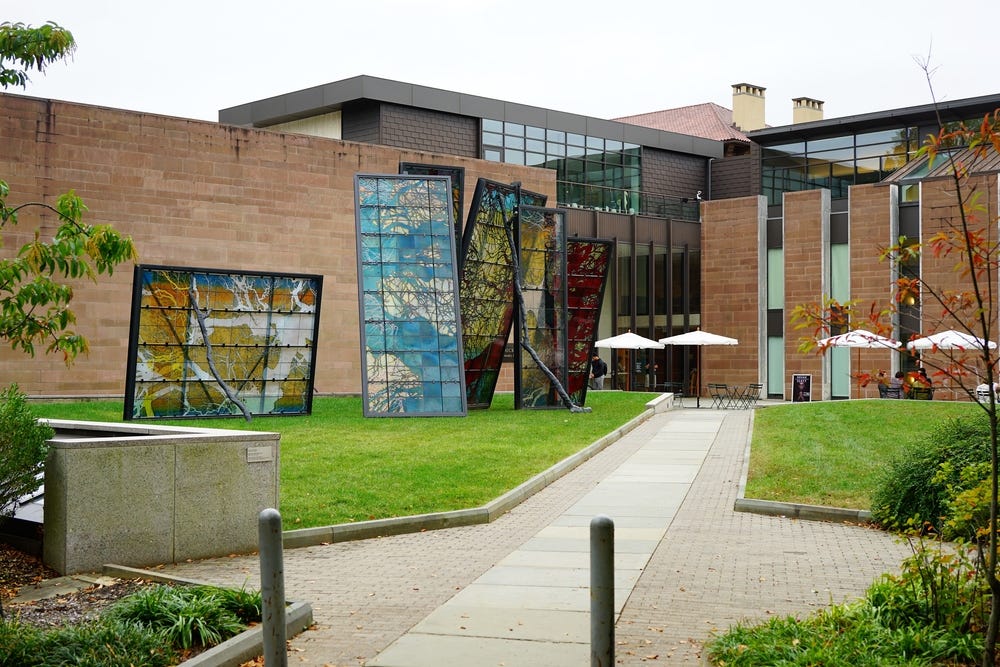E-Pluribus | April 5, 2022
A comedian pandering to wokeness, "diversity" in California has a setback, and Princeton's cancellation of art.
A round up of the latest and best writing and musings on the rise of illiberalism in the public discourse:
Andrew Sullivan: The Problem With Jon Stewart
At his Substack, Andrew Sullivan writes about the ambush he walked into recently after agreeing to appear on comedian Jon Stewart’s Apple TV streaming show, The Problem. Based on excerpts of the transcript from the show, the title might as well have been The Problem Is White People, although one assumes Stewart himself would be exempt.
On the race question, Stewart has decided to go way past even Robin DiAngelo, in his passionate anti-whiteness. His opening monologue was intoned at times in a somber tone, as if he were delivering hard truths that only bigots could disagree with. He argued that no one in America had been prepared to have an honest discussion about race — until the “reckoning” of 2020. He also suggested that nothing had been done by whites to support African-Americans from 1619 (yes, he went there) … till now. The most obvious solution — reparations — was, he implied, somehow, absurdly, taboo.
His montage of “black voices” insisted that African-Americans are still granted only conditional citizenship, are still barred from owning property — “we don’t own anything!” — and ended with Sister Souljah — yes! — explaining that the thing that kills black people are not bullets, but white people. This is the same moral avatar who once said: “If black people kill black people every day, why not have a week and kill white people?” Stewart then hailed Angela Davis — a proud Communist, with a particular fondness for East Germany’s suppression of dissent — and warmly thanked her as “Angela.” But Stewart included not a single black voice of disagreement or nuance. He apparently believes that all black people hold the same view. And all white people just refuse to hear it.
Jon Stewart’s insistence that Americans had never robustly debated race before 2020 is also, well, deranged. Americans have been loudly debating it for centuries. There was something called a Civil War over it. His claim that white America has never done anything in defense of black Americans (until BLM showed up, of course) requires him to ignore more than 300,000 white men who gave their lives to defeat the slaveholding Confederacy. It requires Stewart to ignore the countless whites (often Jewish) who risked and gave their lives in the Civil Rights Movement. It requires him to erase the greatest president in American history. This glib dismissal of all white Americans throughout history, even those who risked everything to expand equality, is, when you come to think about it, obscene.
Read the whole thing.
Wall Street Journal Editorial Board: California’s Diversity Quota Defeat
A state judge in California struck down a California law that required “diversity” quotas for public company boards. The no-brainer ruling has the Wall Street Journal’s editorial board wondering if a lawyer even reviewed the legislation before it was passed.
The 2020 law required public companies headquartered in California to include at least one board director who identifies as a racial or ethnic minority or as gay, lesbian, bisexual or transgender by the end of last year. Companies with five to eight board seats would have to include two “underrepresented” members by the end of this year.
The conservative legal outfit Judicial Watch sued, arguing the law violated the state Constitution’s equal protection clause by establishing explicit set-asides based on racial, ethnic or sexual preference. The law also flouts the U.S. Supreme Court’s Bakke precedent (1978), which struck down strict racial quotas in college admissions.
[ . . . ]
State judge Terry Green didn’t explain his reasoning for enjoining the law, perhaps because it so clearly violates equal protection.
Read it all here.
Robby Soave: Art Curator Accuses Princeton University of 'Anti-Intellectual Surrender to Cancel Culture'
Last year, a Princeton University art show featuring 19th-century Jewish American artwork was cancelled. Although the school contends the organizer pulled out, Leonard Milberg and the curator in charge of the works set to be displayed say that Princeton’s decision to exclude works by two artists who had served in the Confederate army during the Civil War made it impossible to go forward, reports Robby Soave at Reason.
Problems arose last October, during the planning stages of the exhibition. That's when the university's vice provost for institutional equity and diversity became involved, according to Religion News Service. The administrator wanted Ezekiel and Moise dropped.
Milberg, who has previously contributed more than 13,000 pieces to Princeton's collections, balked at the idea of modifying the showcase in order to satisfy administrators' sensitivities.
"Once you start canceling things, it never ends," he told The Daily Princetonian.
Baskind describes Princeton's behavior as "an unfortunate anti-intellectual surrender to cancel culture." She commends Milberg for refusing to sponsor historical revisionism.
"He took a very principled stand by choosing not to fund the exhibition after the library took curatorial matters in their own hands," she says. "He disagreed with Princeton's decision to censor the show and erase history."
Jonathan Sarna, a professor of Jewish American History at Brandeis University whose work had informed the exhibition, also objected to Princeton's capitulation. The fact that two of the most important Jewish American artists of the 19th century were Confederate soldiers is something that merits conversation, not censorship, says Sarna.
Read it all.
Around Twitter
Via Glenn Greenwald, a new Pew poll on the ideological/partisan divide on restricting false information versus free speech concerns:
The Foundation Against Intolerance and Racism (FAIR) has an update on the Emory Law School Free Speech Forum that was denied a charter last year:
Here are excerpts from a David French thread on the extremes of binary political thinking:
Finally, Wesley Yang on “feelings,” rights and gender identity:










